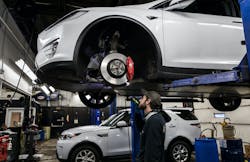The general auto repair industry is shifting. Have you noticed?
Maybe you’ve spotted a steady uptick in the EVs heading to the shop up the street or spied a very distinct name change from a former fully-general competitor.
More and more shop owners are beginning to embrace specialization—and for good reason.
“With the broad spectrum of training, and tools, and equipment, and diagnostic software you have to keep up with to stay competitive, being a generalist is increasingly difficult these days,” says aftermarket analyst and president of Lang Marketing, Jim Lang. “And expensive. Being a generalist can be incredibly expensive just in terms of maintaining the basics.”
Experts also find the increasingly technical nature and complexity of cars hitting the market today to be spurring the shift, potentially overwhelming the average general repair shop.
“The technical expertise you’ll need to service all of those different vehicles as a general shop can be staggering, and it’s becoming even harder to maintain that expertise as independent shops try to compete with the dealerships that know these cars inside and out,” Lang says.
Buzz on the industry shift’s been building for years, but the trend’s actual momentum has been more of a slow and steady climb than a tidal wave as shop owners take their time to think through the move (most general shops are cautiously wading in with a new focus or two, while shops that have already specialized are considering adding new areas of expertise).
The perks may be obvious—adding a new specialty could easily become an additional profit center—but with the tools, training and branding involved, it’s no small decision and may not be the right fit for every shop.
So, where exactly is a shop owner to start and how do you determine if a specialty could be right for your shop? Ratchet+Wrench tapped some top shops already and industry experts to break down the key elements you’ll need to succeed through specialization.
Ideal Location
When it comes to nailing down or deciding against a specialty, both industry experts and shop owners agree geographic location makes all the difference.
A specialty is more likely to pay off in some places more than others, depending on your market’s competition.
“It’s a geographic and competition-driven decision, and the market move away from general repair is becoming stronger and more urgent in metropolitan areas” says Lang.
Shops based in more rural hubs are more likely to have an advantage as generalists and likely won’t want to risk decreasing their market share with a set focus, whereas for shops based in areas with a population of 200,000 or larger, specialization can help eliminate the training and overhead expenses of general repair while servicing a large enough customer base to remain profitable, Lang notes.
“The first thing you have to do is examine your competitive environment to see if specialization and what type of specialty is going to provide you with the maximum benefit,” he says. “What does your market look like? Who would your competitors be?”
For Chris Christensen and Todd Ainsworth, co-owners of Swedish Automotive in Seattle, Wash., location played a role in his team’s decision to begin servicing European brands like Mercedes and Volkswagen.
“We're in a kind of isolated part of Seattle, so to expand and open up that potential for more traffic flow was something we just couldn’t turn down from a profit standpoint,” Christensen says.
And for Jack Crowley, owner of C&J Automotive Specialists in Berwyn and Newtown Square, Pa., location helped clinch the deal in nailing down the EV and hybrid specialty his shops had already begun to explore when a Tesla dealership opened up just down the road.
“We were already starting to work with more [hybrids and EVs] when the dealership opened, and with Teslas needing an inspection before new owners can drive them home, it was just an opportunity we couldn’t pass up,” says Crowley. “It’s helped seal that identity for us in the area and the location piece made it clear that new focus made sense.”
Prime Time
Timing is key. Shop owners that claim a specialty early on can fill a market gap, jumping on a lucrative move before the potential competition.
As more and more shops begin to diversify their services with a specialty expertise, getting in on the ground floor can ensure a shop not only avoids missing the boat, but can help shore up credibility in a shop’s core market.
For Chris Christensen, a community reputation for quality, specialized work was established decades ago when the shop’s original owner opened the location and continues to draw clients today.
“He originally opened the shop nearly 30 years ago out of his garage and incrementally built up the business through word of mouth and quality work,” Christensen says. “With that early stake he set and that history in the community, he’d cornered the market and it’s helped set the shop apart.”
To stay ahead, shop owners are tracking the progress of emerging trends in their market, helping to hone in on specialties poised for future profit potential.
For Crowley, an EV focus was top of mind as soon as he saw the first few on the road in his community. “We dove in on hybrid vehicles and we knew that as soon as the fully electric options started to come out, we wanted to be the first ones in,” he says.
Hitting the ground running on electric vehicles early on, Crowley has begun to leverage that early adoption into brand recognition.
“We want to corner that part of the market as a resource, so that down the line as the volume of these vehicles on the road in our area has multiplied, customers will already be familiar with our work and know we’ve been doing it for years and are the local experts,” he says. “We’re getting to build that up by starting now.”
Built-in Base
The customer base for your new specialty could already be sitting right under your nose.
Calculating the potential ROI of a new specialty could be as simple as reviewing your shop’s core customer base with the relationships you’ve already built ready to be tapped in new ways
“In thinking of jobs a shop has had to turn down or work they’ve had to farm out to another shop or the additional vehicles they know their customers have, those could be natural avenues to specialties with an established customer relationship already baked in,” says Lang.
Christenson’s decision to expand to European vehicles was bolstered by the knowledge that his existing customers could start to bring in their other cars.
Same goes for Paul Garrett, owner of YHS Automotive Service Center in Katy, Texas, who originally opened his shop in 2013 to service Hondas and Acuras but expanded his services to meet the needs of his loyal clientele.
“I was starting to build some strong relationships with my clients and I know it can be hard for some customers to trust repair shops, so they started coming to me with jobs I normally would not have taken,” Garrett says. “They’d come in with so many questions like ‘My daughter has a fill in the blank. Can you fix it?’and it was so hard to tell them no, especially in a win-win situation like that. They’re working with someone they trust and we’re tapping a new part of our customer base we hadn’t been reaching.”
And for Crowley, he and his team at C&J saw the payoff for their work to master hybrids early on as their customers who originally brought in gas motor vehicles could now bring in their Priuses and Ford Fusions. Now, as some of those same customers begin to bring in Teslas as well, the shop is ready and prepared to keep that work in-house.
A Clear Identity
A new specialty could help your shop stand out from the crowd, creating a clearer marketing calling card that helps new customers find you as you begin to promote your new or niche expertise.
“It’s much more difficult to advertise yourself as a generalist without calling attention to some sort of specifics you excel at ,” says Lang. “You know your customer service is top notch and you do great work, but a new customer doesn’t know that. They’d have to take your word for it or sift through reviews. But, they can look online to see that you specialize in the exact vehicle they drive and offer service on the specific issue they’ve been having. It’s much more clear cut for them at the end of the day.”
Shop owners like Christensen find that with clear specialties (and even clearer shop names), a clear brand identity helps to funnel the ideal core customer base to the shop (although getting the word out about additional specialties requires more effort).
That clear, specialized expertise has helped him and his team build relationships with neighboring shops as well, bringing a stream of referral work their way as well as an avenue for specific tool sharing.
And for Crowley, a specialization in EVs and hybrids has helped form lucrative partnerships. After working on their first Tesla, the C&J team reached out and cultivated a partnership with Tesla’s corporate team. Now anyone buying a Tesla at the local dealership receives a welcome email from the brand that also includes C&J’s information and owners are sent C&J’s way for their new vehicle inspections.
With the partnership underway for over a year now, the shop has started to see the customers who initially visited for their new vehicle inspections return for minor routine maintenance. And while Crowley knows tire changes and brake fluid flushes aren’t the shop’s bread and butter, “at some point, those cars are going to have brakes and suspension issues and those customers will be back,” he says. “That gives us more time to master it so we’ll be even more prepared when they’re back for something more extensive.”
Talent Pool Potential
A deep bench could also help pinpoint a shop’s next avenue for success.
By tapping the uniquely-trained talent already working in-house, shop owners exploring a specialty can bypass one of the biggest challenges facing shop owners these days in the search for key staff.
In his move to expand service to European vehicles at his shop, Garrett’s addition of a skilled tech in the specialty made all the difference. With 30 years of experience and a toolbox stocked with scan tools and equipment for European vehicles, Garrett was able to move forward with the shop’s new focus.
“Honestly it came down to finding the right people,” says Garrett, who was grateful his new tech had experience in working for a dealer—a key source for skilled talent that those hoping to specialize could tap in the process.
“The way I look at it is, tools can be purchased and they are a key investment, but it's all about your personnel,” Garrett said. “You can have all of the tools you’ll ever need but the real challenge is getting someone in your shop that knows the tools, knows the vehicles and can deliver quality work.”




